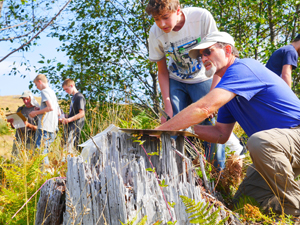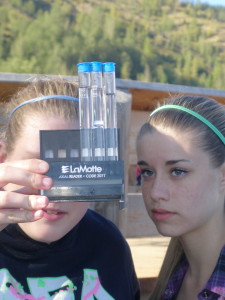Mount St. Helens High School STEM Field Study
In order to provide opportunities for students to gain real-word experience and insights into scientific/technical careers, this program provides students with project-based learning through ecological research conducted alongside Mount St. Helens scientists in the field. The volcano is a unique outdoor classroom and laboratory for studying the response of aquatic and terrestrial systems. Student experiences are further enhanced by the opportunity to conduct comparisons along a gradient of disturbance from the 1980 eruption overlain by a variety of post-eruption timber management regimes (cut prior to 1980, salvage logged and replanted).
Students work side-by-side with Mount St. Helens scientists and land managers to collect data, develop a question, enter and analyze the data. Students then prepare a poster presentation and meet at Washington State University-Vancouver to present their results to other students and to scientists, land managers and educators from the community. This is an on-going project with permanent research plots. Data are available from each study year.
Lessons include:
- Introduction to field studies
- Ecological response to 1980 eruption of Mount St. Helens
- Vegetation and aquatic sampling protocols
- Developing a research question
- GPS use and mapping
- Leave No Trace ethics
- Field-based data collection
- Data entry and analysis using Excel
- Presentation development and public speaking
For information on 2016 programs, please contact: agroskopf@mshinstitute.org
Participating Schools: Castle Rock High School, Toutle Lake High School, Wahluke High School, iTech Prep, Centralia High School, and CASEE (Center for Agriculture, Science and Environmental Education).
Partnering Organizations include: Mount St. Helens Institute, Washington STEM, USFS Mount St. Helens National Volcanic Monument, USFS Pacific Northwest Research Station, Washington State University-Vancouver, World Forestry Institute, ALS Global, Vernier Software and Technology, Pacific Education Institute, Chevron, Washington Department of Natural Resources, and the Weyerhauser Family Foundation.




